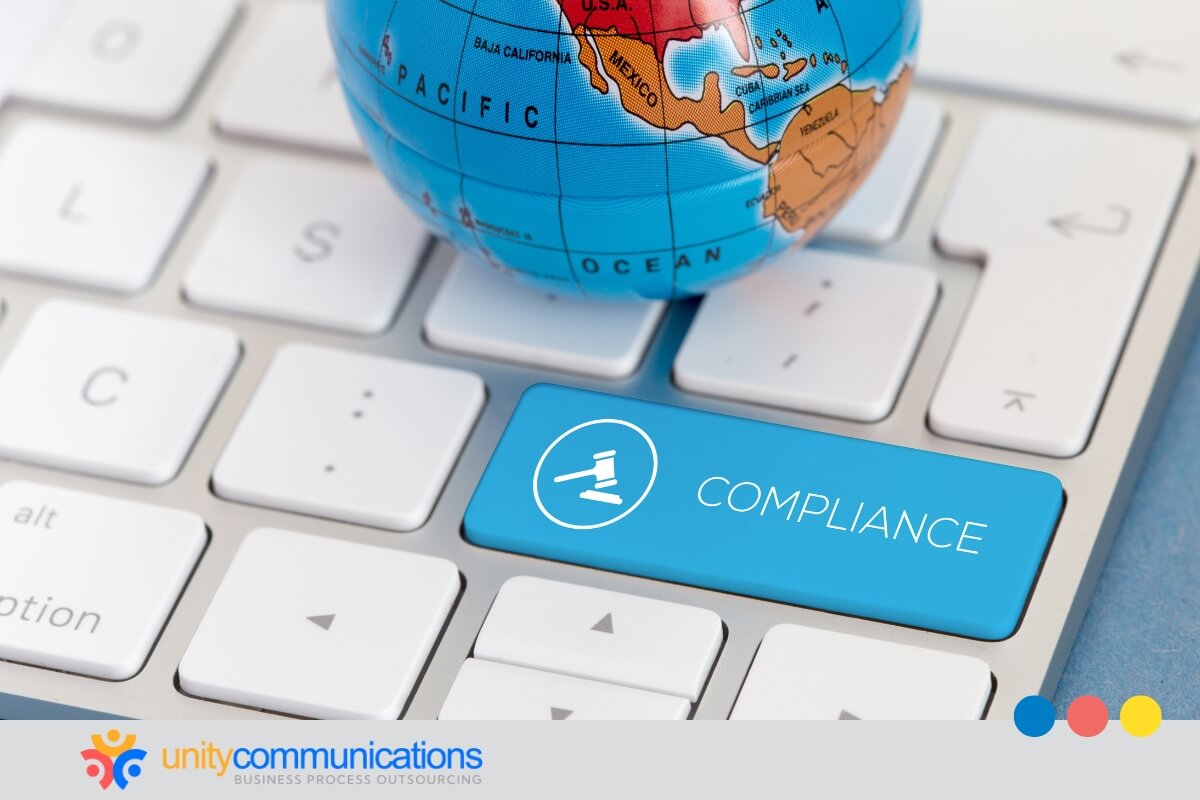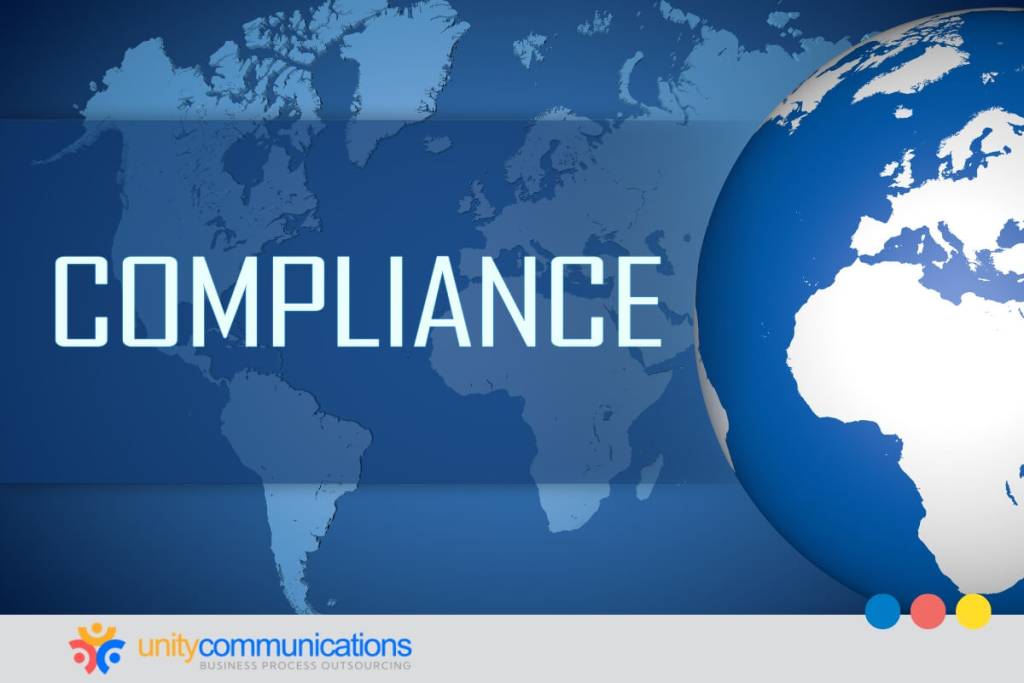Table of Contents
Adherence to global compliance standards is a cornerstone of a business process outsourcing (BPO) provider’s operational integrity and trust. In today’s interconnected business ecosystem, full compliance is a necessity and a strategic advantage.
This article explains why it’s so crucial for BPO providers to follow global compliance standards, highlighting their impact on data security and client confidence. It also explores the multifaceted dimension of compliance and shares best practices for upholding ethical conduct and legal obligations.
Keep reading to learn more.
Safeguarding BPO: Key global compliance standards to watch

In BPO, global compliance standards refer to the set of regulations, laws, and industry standards that companies must adhere to while operating across different countries and regions. These standards ensure that BPO operations are conducted ethically, legally, and securely to safeguard the interests of clients and end users.
Below are some key elements of global compliance standards in the BPO industry.
Data protection
BPO companies must abide by various data protection laws and global compliance standards, depending on their jurisdictions and the types of data they handle. In 2023, 73% of leaders agreed that cybersecurity and privacy regulations effectively diminished their organizations’ cyber risks.
Some of the most notable data protection laws include:
- General Data Protection Regulation (GDPR). The European Union (EU) enacted the GDPR, a comprehensive data protection law, to control the processing of personal information. It applies to all BPO companies that handle the personal data of individuals residing in the EU, regardless of where the BPO company is located.
- California Consumer Privacy Act (CCPA). The CCPA is a state-level data protection law in the United States aimed at enhancing privacy rights and consumer protection. It applies to BPO companies that handle the personal information of California residents and imposes obligations such as disclosure of data collection practices.
- Personal Data Protection Act (PDPA). The PDPA is a data protection law in Singapore that regulates the collection, use, and disclosure of sensitive data. BPO companies operating in Singapore must comply with the PDPA, which includes requirements such as obtaining consent for data processing and ensuring data accuracy.
- Personal Information Protection and Electronic Documents Act (PIPEDA). PIPEDA is a federal privacy law in Canada that governs the collection, use, and disclosure of personal information by private organizations.
Sector-specific regulations
BPO companies operate across various sectors and industries, each with its own regulations and compliance requirements. For instance, BPO companies handling financial transactions adhere to compliance standards to protect clients. Given that 83% of documented data breaches have a financial motivation, security and compliance in these functions are essential.
Here are some sector-specific regulations that BPO companies follow:
- Financial services. Firms working with financial institutions must comply with the Sarbanes-Oxley Act (SOX), which mandates financial reporting and internal controls for publicly traded companies. Compliance with the Payment Card Industry Data Security Standard (PCI DSS) is also necessary when handling credit card information.
- Healthcare. BPO companies serving healthcare clients or handling protected health information (PHI) must ensure compliance with the Health Insurance Portability and Accountability Act of 1996 (HIPAA) in the U.S. HIPAA requires firms to implement safeguards to protect patient information.
- Telecommunications. BPO companies providing services to telecommunications companies might need to comply with regulations related to data privacy, customer data protection, and network security. Compliance with industry-specific standards and regulations set by regulatory authorities in each jurisdiction is essential.
- Government and public sector. BPO companies providing services to government agencies or handling sensitive government data must comply with data privacy regulations and government procurement processes. Compliance with the Federal Information Security Modernization Act (FISMA) in the United States may be necessary.
- Insurance. BPO companies serving insurance companies or handling insurance-related processes, including payment data security hosting, must comply with regulations governing insurance transactions, data protection, and consumer rights. Compliance with the Insurance Data Security Model Law and the Insurance Information and Privacy Protection Act (IIPPA) may be required.
Outsourcing regulatory compliance (ORC) guidelines
Several nations, such as India and the Philippines, have instituted ORC guidelines explicitly tailored for the BPO sector. These directives cover data security, local data storage requirements, intellectual property (IP) protection, and labor law adherence.
BPO enterprises within these nations must establish suitable data security measures to abide by the ORC guidelines and uphold labor standards and IP rights.
Adhering to the ORC guidelines enables BPO firms to cultivate robust partnerships with their clientele and showcase a dedication to lawful and moral conduct within their jurisdictions.
The importance of compliant BPO operations
For BPO companies, failure to abide by global compliance standards leads to legal penalties and regulatory sanctions. Here are reasons why adherence is critical in BPO operations:
- Violation of agreement terms. Numerous business-to-business (B2B) contracts necessitate adherence to global standards. Neglecting these standards can constitute a breach of contract. Consequently, the contract might be terminated, leading to potential legal actions such as court injunctions and compensatory damages.
- Revocation of licenses or approvals. Across various sectors, businesses often require regulatory endorsement for specific licenses or permissions (e.g., financial services licenses). Neglecting compliance with these requirements can lead to the withdrawal of such licenses and approvals.
- Legal repercussions. Should a company neglect to adhere to criminal statutes, such as those pertaining to anti-bribery, anti-money laundering, and anti-fraud, its officers might face imprisonment and other criminal sanctions.
- Ethical considerations. Compliance with global standards reflects a commitment to ethical business practices, including respect for human rights, labor standards, and environmental sustainability. BPO companies prioritizing compliance contribute to the broader goal of responsible and sustainable business conduct.
BPO strategies to ensure adherence with global compliance standards

For BPO firms, the ever-changing landscape of global compliance standards can be challenging. So, what can BPO companies do to continuously guarantee adherence?
Consider the following strategies:
- Gain deep knowledge. Identify the regulations that cover your BPO’s services and your clients’ industries. Subscribe to updates and industry publications to stay informed about new rules and changes to existing ones.
- Build a strong compliance program. Create comprehensive policies and procedures that outline how your BPO company will comply with relevant regulations. These policies should address data privacy, security protocols, communication guidelines, and industry-specific requirements.
- Appoint a compliance officer. Designate a dedicated person or team to oversee compliance efforts. This individual will monitor adherence, conduct training, and stay updated on regulations.
- Implement robust security measures. Invest in robust cybersecurity measures to protect sensitive data. Examples include firewalls, intrusion detection systems, data encryption, and access controls. Conduct periodic risk assessments to identify and mitigate potential security vulnerabilities.
- Empower your employees. Provide regular employee training on relevant compliance regulations, security best practices, and the BPO firm’s internal policies. Foster a culture of open communication where employees feel comfortable raising concerns about potential compliance issues.
- Embrace a culture of compliance. Integrate compliance into your company’s culture. Make it a core value and emphasize its importance to maintaining client trust and avoiding legal repercussions.
How technology facilitates BPO compliance with global standards
Technology plays a vital role in improving BPO security and upholding adherence to global compliance standards. Here are examples of advanced technology and its critical use cases:
- Compliance management software. Implement software that automates data breach reporting, risk assessments, and access control management. Automation streamlines compliance processes, reduces manual errors, and saves time.
- Data encryption tools. Utilize data encryption tools to safeguard sensitive client information at rest and in transit. Encryption ensures compliance with data privacy regulations such as GDPR.
- Security information and event management (SIEM) systems. SIEM systems provide real-time monitoring of BPO networks and systems, allowing quicker detection and response to security threats. They help maintain compliance with data security standards such as PCI DSS.
- Two-factor authentication (2FA). Enforce 2FA for user logins to add an extra layer of security and prevent unauthorized access to sensitive data.
- E-learning platforms. Use e-learning platforms to consistently and efficiently deliver compliance training to employees. They ensure that all staff are up-to-date on relevant regulations and company policies.
- Compliance simulation tools. Implement simulation tools that create realistic scenarios to train employees to identify and handle potential compliance issues.
The bottom line

For BPO operations, global compliance standards are essential to meet legal obligations, earn client trust, protect data, and uphold ethical standards. By prioritizing compliance, BPO companies can position the organization for long-term success and sustainability in the global marketplace.
Let’s connect if you want to learn more about outsourcing.




